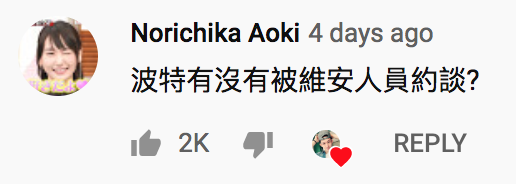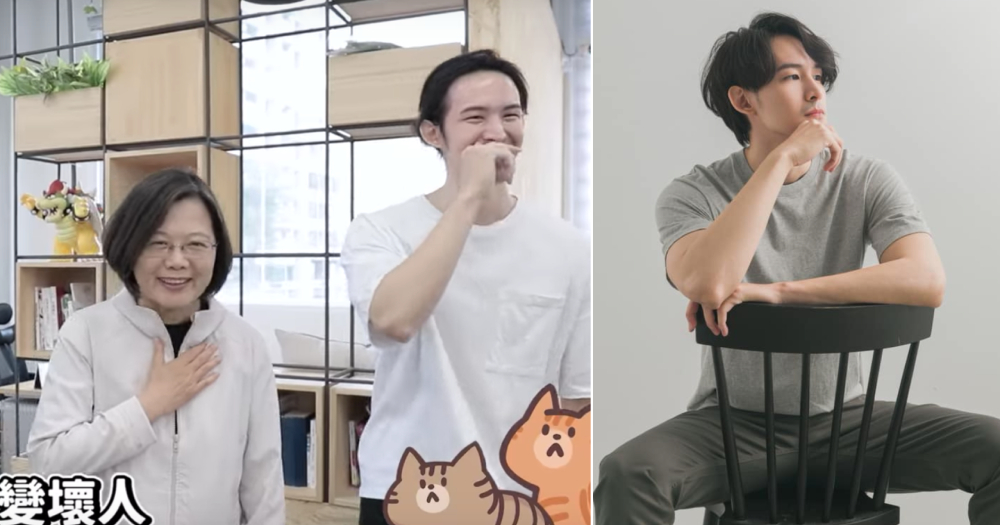A Taiwanese YouTuber has lost his partnership with a Chinese company after refusing to give in to its request to take down an interview he did with Taiwanese President Tsai Ing-wen.
Called Tsai "president" in video
Potter King (波特王), who has considerable following on both sides of the Taiwan Strait, posted a video where he tried some of his signature pick-up lines on Tsai.
In the video titled, "First YouTuber to flirt with a president", Chen Chia-chin (his real name) repeatedly addressed Tsai as "president".
Video drew ire from Chinese agency
The video has since drawn ire from his Chinese agency, Papitube, which helps promote his videos on mainland Chinese platforms as YouTube is banned in mainland China.
In a Facebook post published on Sunday, Dec. 15, Chen posted a series of screenshots of a WeChat conversation he had with the representatives from Papitube.
A Papitube staff had expressed his disbelief that Chen used the word "president" to refer to Tsai in the video, and demanded him to take down the video "immediately".
Contract was nullified
In response to Papitube's request, Chen said he would do an interview with the Chinese President Xi Jinping as well if the latter is willing to, although he did not refer to him as the "Chinese President".
Papitude then said the matter is "extremely serious", and that they would nullify his contract if Chen does not do as they say.
That was when Chen's Taiwanese business partner, Mars Lee, said, "So be it."
Would rather not earn the RMB
In his Facebook post, Chen wrote that he really could not agree to their demands, which he thought were too "ridiculous".
"If we can't even address our country's leader as 'president', then we'd rather not earn this money," he said.
"Although the losses for this month were not small, but we really can't kneel down."
Chen also wrote that his company was locked out of their Weibo account.
In another Facebook post published on Wednesday, Dec. 18, Chen revealed the terms of the contract he signed with Papitube, which show that his partnership with the Chinese agency was limited to mainland China only.
This means Papitube had no say to the content Chen chooses to put up in Taiwan.
Papitube criticised Chen
In a Weibo statement released on Sunday, Dec. 15, Papitube "strongly condemned" Chen's "inappropriate behaviour" on social media, saying it was unacceptable to the company.
"Papitube strongly condemns any word or action that damages the country's national dignity, stands by the 'one China' principle, and defends the country's national sovereignty."
The statement was met with widespread support from Chinese commenters, who also criticised Chen for supposedly advocating for Taiwanese independence.
 Screenshot via Papitube/Weibo
Screenshot via Papitube/Weibo
"Voicing his support for Taiwanese independence, who else to block but him?"
 Screenshot via Papitube/Weibo
Screenshot via Papitube/Weibo
"I stand with Papitube, a positive company that has great morals. Like."
Fans express support
But for refusing to give in to Papitude's request, Chen received widespread support from his followers.
 Screenshot via Potter King/YouTube
Screenshot via Potter King/YouTube
"Was Potter invited to have a chat with the security personnel?"
 Screenshot via Potter King/YouTube
Screenshot via Potter King/YouTube
"Thank you for not bowing before the Renminbi. I really appreciate you (for doing that)!"
 Screenshot via Potter King/YouTube
Screenshot via Potter King/YouTube
"This is the difference between a democratic country and the People's Republic of China on the other side of the strait."
Received support even from mainland Chinese
Many of the commenters who expressed their support for Chen also claimed they were mainland Chinese.
 Screenshot via Potter King/YouTube
Screenshot via Potter King/YouTube
(In simplified Chinese) "Democracy's so good, an elected leader is truly down to earth and close to the people."
 Screenshot via Potter King/YouTube
Screenshot via Potter King/YouTube
"Well done for having a backbone and not kneeling down. And this is coming from a mainland Chinese born in Beijing."
 Screenshot via Potter King/YouTube
Screenshot via Potter King/YouTube
"How precious! I'm typing with traditional Chinese, but I'm a mainland Chinese! For sticking to your principles, I've become a new subscriber. I really like your videos and your righteous values."
Some of them even referred to Tsai as "president".
 Screenshot via Potter King/YouTube
Screenshot via Potter King/YouTube
"The Taiwanese president gels really well with the people, I'm a mainland Chinese but I really like the Taiwanese president."
 Screenshot via Potter King/YouTube
Screenshot via Potter King/YouTube
"I've subscribed, I wouldn't have known you otherwise if you didn't get blocked! Haha, go Taiwan, go Potter King, go President Tsai! I'm from mainland China..."
 Screenshot via Potter King/YouTube
Screenshot via Potter King/YouTube
"A mainland Chinese living in Nanjing stans you! I admire your backbone! Hope you make more of such videos!"
 Screenshot via Potter King/YouTube
Screenshot via Potter King/YouTube
"(I'm a) mainland Chinese who has come specially to show his support. Go Taiwan and Hong Kong."
 Screenshot via Potter King/YouTube
Screenshot via Potter King/YouTube
"Mainland Chinese here. Because you resisted against a bully, and defended freedom with your courage and beliefs, I've officially become your fan."
Chinese media avoids saying "Taiwan president"
Chinese state media typically avoids referring to Tsai as "president", preferring to use the terms "Taiwan leader" or "regional leader" instead, according to Bloomberg.
This might be due to the underlying connotations associated with the word "president", as it implies that Taiwan is an independent, sovereign country.
Beijing views Taiwan as a renegade province that needs to be reunited with the "motherland", even if force has to be used.
Relations between Taipei and Beijing have taken a dip under the Democratic Progressive Party (DPP) after Tsai refused to affirm the "One China" consensus, which is a mutual agreement that there is only “one China”, although both sides interpret it differently.
Chinese sensitivities
This incident comes as China's domestic censorship regime is increasingly being brought to the forefront.
In October this year, China's state broadcaster CCTV dropped the National Basketball Association (NBA) games after Houston Rockets General Manager Daryl Morey sent a tweet that supported the anti-government protests in Hong Kong.
Chinese businesses also suspended their dealings with the Rockets.
Just last week, CCTV removed the match between Arsenal and Manchester City on Dec. 14 after Arsenal football club midfielder, Mesut Özil, tweeted his criticism of the Chinese government’s treatment of its Muslim Uyghur minority.
Both the NBA and English Premier League have increasing commercial interests in the country.
To continue doing business with China, foreign firms are wont to submit to Chinese political sensitivities.
Related articles:
Top image adapted via Potter King/YouTube & Potter King/FB
If you like what you read, follow us on Facebook, Instagram, Twitter and Telegram to get the latest updates.
